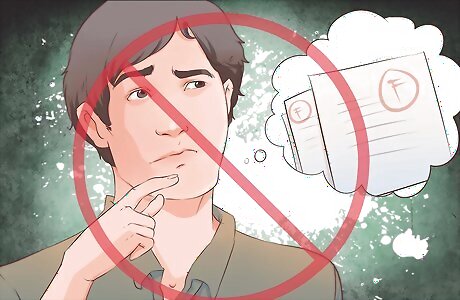
views
Dealing with Bullying or Abuse

Turn the other cheek. Bullies and haters do what they do in order to exert power. They want to know that they have the ability to control you, including your emotions and reactions. Don’t give them that satisfaction. Ignore them as an effective counter. Ways to ignore a bully include walking away, acting as if you aren’t listening to them, or telling them that you’re not interested in what they are saying. For example, you have options if a bully tells you that your school project was terrible. You can walk away. You might also tell him directly, “Your opinion doesn’t really matter to me.” Ignoring a bully doesn’t necessarily mean acting as if the abuse isn’t taking place. What it means is that you refuse to react how they want you to react.

Deflate the bully. Deflating can be a bit like ignoring. In both cases, you are denying the bully the satisfaction of having power over you and your emotions. The difference is that you are engaging their behavior but in a way that derails it. Saying something as simple as “Why would you say that?” turns an insult back on the bully, without seeming aggressive. You might also try being dismissive of the bully, saying “Really?” “Whatever,” or even pretend not to hear. All can help to deflate the bully’s behavior. The key to deflation is to confront the hater without retaliation. You poke a hole in their attempt to control you. If they see that you aren’t vulnerable to their abuse, they may move on.

Remove the hater’s audience. Bullies and haters need audiences. They do not abuse others for the sheer fun of it but in order to establish a place in a social pecking order – to raise themselves at your expense in the eyes of others. If you take away their audience, they lose their purpose and power. This technique is not always easy and might be outside of your control. However, you can sometimes work against a bully. Try deflating them in front of others, for example. Say that you walk into the lunch room and your hater starts to tear down your performance in the school play in front of a group. Saying, “Geez, it’s only a play. Hey Alex, I heard that you scored tickets to the big game. Great!” both deflates the bully and deflects the conversation. You have taken away his audience.

Tell someone. Growing up, a lot of us heard that we shouldn’t be “tattletales.” This advice isn’t very good when it comes to bullying and may even be harmful. Be willing to talk to someone if you are experiencing out of control bullying or abuse, especially if it is physical. Talk to a trusted adult, a teacher, a family member. It is in your interest to report threats and assaults. If you don’t, the bully may become more aggressive. Your safety should come first. Standing up to abuse is your choice, but don’t take unneeded risks with an aggressive hater or bully. Tell someone if you feel threatened or in danger.
Telling Destructive from Constructive Criticism

Note the intent. Sometimes we get feedback we don’t want to hear. Whether from a classmate, a teacher, a coach, or a parent, criticism isn’t always “hating.” It’s meant to be constructive. There’s a big difference. Bullies abuse, hate, and tear down. That is “destructive criticism.” Constructive criticism, on the other hand, is meant to help us. Intent is the big difference between these two kinds of criticism. Why is a person criticizing you? If they are trying to hurt you, to be cruel, or to just tear you down, it’s destructive. If a person gives criticism that points out your mistakes or faults, but also how you can improve, it is constructive. It still might hurt, but it is worth listening to. Say that your hockey teammate tells you, “You’re a terrible skater” or “You really suck out there.” These are examples of destructive criticism – “hating.” It would be constructive if your teammate had said, “You’re a weak skater. Try bending more at the knees and getting lower to the ice. You’ll get more power in your stride”

Note the target of criticism. Not only intent but the target of criticism is important in determining whether it is destructive or constructive. Destructive remarks target the individual – you. They are meant to attack you as a person. Constructive criticism does not do this. It focuses instead on your work, your skills, a concept, a process, or something else. It is impersonal. Examples of destructive criticism include, “You’re stupid,” “What’s wrong with you?” “You’re doing this all wrong.” Note that the criticism attacks you and your personal worth. Examples of constructive criticism include, “Your writing sounds kind of stilted. Try to use simpler sentences,” or “You nearly hit that car. Always check your blind spot before changing lanes.” It can be hard to separate yourself from your work or other things that you love. Try not to take it personally. Someone who criticizes your writing, for example, is not attacking who you are as a person. They may just want to help you improve.

Note tone of criticism. How criticism is delivered is also important. Destructive and constructive criticism can both be harsh and difficult to hear. Tone is a key separator, however. A destructive critic usually takes a hurtful tone, maybe contempt, maybe mockery, or maybe just insults. Constructive critics may point out faults, but their tone is supposed to be cruel. For example, a hater would say something along the lines of “Only an idiot would do it this way.” The tone is very personal, insulting, and hurtful. A constructive critic might take the same fault but express it more kindly: “This is wrong, but it’s a common mistake. What you could have done differently is...” Note that the tone is more impersonal and leads to a piece of advice.

Note the lack of substance of advice. At heart, the advice is what most separates destructive from constructive criticism. The first aims only to tear down, without offering suggestions for the future. The second, on the other hand, is meant to offer advice and to help you improve. A hater will never (or rarely) have suggestions for how you can improve, e.g. “That was pathetic!” or “Why did you waste your time on that?” Constructive criticism offers useful advice. For example, say you get a low grade on a paper and the comment, “It seems like you wrote this essay very fast. It is filled with errors. Always make sure to proofread!” This criticism may be blunt, but it offers genuine advice.

Be open to constructive criticism. Lots of people talk about “haters” when they get a piece of criticism. While there are lots of critics out there, we sometimes fall back on the word “hater” as a way to avoid confronting our own failures. In other words, we dismiss criticism when we “lack the self-awareness to critique and improve.” Criticism can be hard to hear. However, we sometimes need to hear the truth in order to grow. Don’t resist all criticism. Learn to tell constructive criticism from destructive criticism. Be open to criticism when it’s mean to help you.
Accepting Constructive Criticism

Listen. Once you’ve recognized constructive criticism, learn how to grow from it. The first step is to hear the person out. You may need to practice this, as your first reaction is often to become defensive. Listen to them before you do anything. Try to remain objective or outside yourself when getting constructive feedback. Remind yourself, “They aren’t attacking me. This isn’t about me personally.” Try active listening techniques during the conversation, like paraphrasing. If you are getting written feedback, read and re-read the comments to make sure that you understand.

Ask questions. Be careful not to misinterpret criticism. If you have the chance, follow up with questions and ask for clarification on points that you do not understand. Asking questions will help you to better grasp what is being said, internalize the criticism, and find a solution. For example, “Can you please clarify what you meant when you said that my thesis statement was “fuzzy?”

Don’t lash out. It is easy to get defensive when faced with criticism. Tell yourself over and again that constructive criticism is not personal. Resist the feeling and try to be open. Whether it is a peer, a boss, a teacher, or a loved one, remind yourself that they are, after all, probably just trying to help. Take a deep breath if you feel overwhelmed or angry. Think: is it the criticism that bothers you or the way in which the criticism was delivered? If the criticism is constructive, overlook the delivery.

Decide whether it is accurate. Resist the urge to dismiss criticism out of hand. Take some time to think it over. Is it accurate? Is it fair? Try to be as neutral as you can. You may risk missing an important truth if you ignore criticism. Consider asking a friend, mentor, or family member about criticism – make sure that it is someone whom you trust but who will give you the truth. For example, “Sam, my teacher said she thinks I’m working below my ability. I trust you and want to know your opinion.”

Take steps to address the problem. If you’ve faced constructive criticism, listened and assessed it, and decided that it is accurate, the next step is to make a change. At this stage, you can probably see clearly what the problem is and have gotten beyond your frustration or anger. Implement a plan to address the problem. Self-reflection is a sign of maturity. Responding to criticism will not only help you, but also shows others that you are willing to face up to your weaknesses, address them, and improve.


















Comments
0 comment